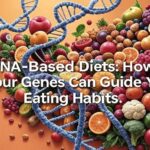
DNA-Based Diets: How Your Genes Can Guide Your Eating Habits
Unlock the secret to eating right for your unique body!
 Have you ever wondered why some people thrive on a low-carb diet while others feel amazing eating more grains? The answer might be hiding in your DNA! Gone are the days of the “one-size-fits-all” diet—today, personalized nutrition and biohacking are taking center stage. By looking at your unique genetic makeup, you can tailor your eating habits to boost your health, energy, and even mood. Let’s explore how DNA-based diets work, why they matter, and how you can get started on this exciting journey to better nutrition.
Have you ever wondered why some people thrive on a low-carb diet while others feel amazing eating more grains? The answer might be hiding in your DNA! Gone are the days of the “one-size-fits-all” diet—today, personalized nutrition and biohacking are taking center stage. By looking at your unique genetic makeup, you can tailor your eating habits to boost your health, energy, and even mood. Let’s explore how DNA-based diets work, why they matter, and how you can get started on this exciting journey to better nutrition.
What Are DNA-Based Diets?
A DNA-based diet is all about customizing what you eat based on your genes. Your DNA is like a personal instruction manual that scientists can read to understand how your body processes food, absorbs nutrients, and handles things like sugar or fat. Biohacking—the practice of using science and tech to optimize your body and mind—plays a big role here, helping you use this genetic info to make smarter food choices.
For example, some people have genes that make them more likely to store fat if they eat too many carbs, while others can handle carbs better. A DNA-based diet takes this into account, suggesting foods and meal plans that suit your genetic profile. It’s like having a nutritionist built into your genes!
Why Your Genes Matter for Nutrition
We’re all unique, and our bodies don’t always react the same way to food. Here’s why your genes are key:
- Nutrient Absorption: Some people absorb vitamins like B12 or iron more efficiently, while others need more from their diet.
- Metabolism: Your genes can affect how fast or slow you burn calories, influencing whether a high-fat or low-fat diet works best.
- Food Sensitivities: Genetic testing can reveal if you’re prone to issues like lactose intolerance or gluten sensitivity.
- Weight Management: Certain gene variants can make weight loss harder or easier, guiding you to the right eating strategy.
By understanding these differences, you can avoid the frustration of following a diet that doesn’t work for you and instead embrace one that’s tailored just for you.
How DNA-Based Diets Work
Getting started with a DNA-based diet is easier than you might think. Here’s the basic process:
- Genetic Testing: You take a simple test—usually a cheek swab or saliva sample—sent to a lab. Companies like 23andMe or specialized nutrition services analyze your DNA.
- Results Analysis: The lab looks at specific genes related to diet, like those affecting metabolism or food sensitivities, and sends you a report.
- Personalized Plan: Based on your results, you get recommendations for foods, portion sizes, and even meal timing that suit your genetic makeup.
- Ongoing Adjustments: You can tweak your plan with help from a nutritionist or app, combining it with data from wearables like smartwatches.
It’s a bit like unlocking a secret code to your body, and the results can be life-changing!
Benefits of Eating for Your Genes
Switching to a DNA-based diet can offer some amazing perks:
- Better Energy: Eating foods your body handles well can reduce fatigue and keep you feeling lively all day.
- Improved Digestion: Avoiding foods your genes struggle with can ease bloating or discomfort.
- Weight Loss Success: Tailored plans can help you shed pounds more effectively than generic diets.
- Healthier Aging: Optimizing your nutrition can lower risks for conditions like heart disease or diabetes, which may be influenced by your genes.
Plus, it feels empowering to know you’re feeding your body exactly what it needs!
Foods to Consider in a DNA-Based Diet
While your genetic results will be unique, here are some general food categories that often come up in personalized plans:
- Healthy Fats: Avocados, nuts, and olive oil might be emphasized if your genes favor fat metabolism.
- Lean Proteins: Chicken, fish, or plant-based options like lentils could be key if you need more protein.
- Complex Carbs: Whole grains like quinoa or sweet potatoes might work if your body handles carbs well.
- Veggies and Fruits: Leafy greens and berries are often recommended for their antioxidants, adjusted to your nutrient needs.
Your test might also suggest avoiding certain foods, like dairy or gluten, if your genes indicate a sensitivity.
The Role of Biohacking in Personalized Nutrition
Biohacking takes DNA-based diets to the next level. It’s about using tools and data to fine-tune your health. Here’s how it fits in:
- Wearable Tech: Smartwatches track your heart rate, sleep, and activity, giving you real-time insights to pair with your diet.
- Blood Tests: Regular checks can show how your body responds to your eating plan, letting you adjust as needed.
- Apps and Data: Apps can analyze your food intake and genetic data, offering personalized tips daily.
Together, these tools help you become a health detective, experimenting and optimizing based on what your body tells you.

Is a DNA-Based Diet Right for You?
While it sounds exciting, it’s not for everyone. Here are some pros and cons to consider:
Pros:
- Highly tailored to your needs, increasing the chances of success.
- Can prevent trial-and-error with diets that don’t work.
- Supports long-term health goals with science-backed insights.
Cons:
- Costs can be high for testing and follow-up support.
- Results need expert interpretation to be useful.
- Lifestyle changes might feel overwhelming at first.
If you’re curious, start by researching reputable testing services and consulting a dietitian to see if it fits your budget and goals.
Getting Started with Your DNA Journey
Ready to give it a try? Here’s how to begin:
- Research Companies: Look for trusted providers that offer detailed nutrition reports, like AncestryDNA or Nutrigenomix.
- Take the Test: Order a kit, follow the instructions, and send it back—usually takes a few weeks for results.
- Work with a Pro: A nutritionist can help you understand your report and create a plan.
- Track Progress: Use a journal or app to note how you feel with new foods.
A Sample Day on a DNA-Based Diet
Here’s an example based on a hypothetical genetic profile favoring healthy fats and moderate carbs:
Breakfast: Avocado toast on whole-grain bread with a poached egg.
Lunch: Grilled salmon salad with spinach, walnuts, and olive oil dressing.
Snack: A handful of almonds and a piece of dark chocolate.
Dinner: Quinoa stir-fry with broccoli, chicken, and a side of berries.
Your plan would be adjusted based on your specific results!
Final Thoughts: Eat Smart with Your DNA
Personalized nutrition and biohacking are revolutionizing how we think about food. A DNA-based diet lets you move beyond generic advice and eat in a way that’s truly right for you. It’s not just about losing weight—it’s about feeling your best, inside and out. If you’re ready to take control of your health, exploring your genes could be the first step toward a happier, healthier you.
Have you tried a personalized diet or biohacking tool? Share your experience in the comments—we’d love to learn from you!
![]()




